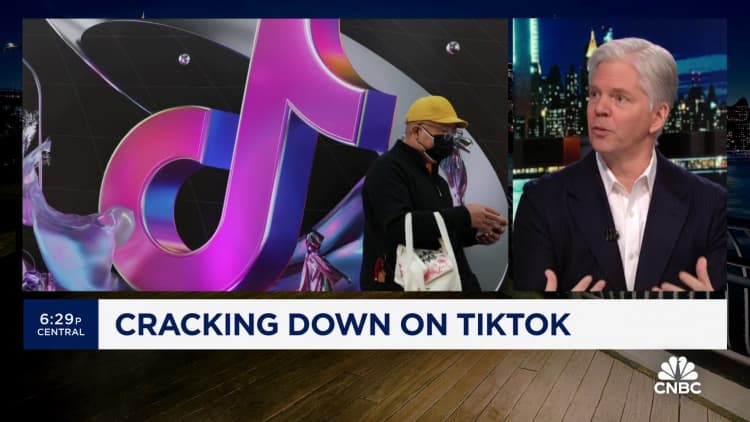The House approved a bill Wednesday that calls for China tech giant ByteDance to divest TikTok or the popular social video app will effectively be banned in the U.S.
The measure passed with a resounding 352-65 vote and with one member voting present.
The legislation, dubbed the Protecting Americans from Foreign Adversary Controlled Applications Act, was introduced March 5 by Reps. Mike Gallagher, R-Wis., and Raja Krishnamoorthi, D-Ill., of the House Select Committee on the Chinese Communist Party. Two days later, House members on the Energy and Commerce Committee voted unanimously to approve the bill, which refers to TikTok as a threat to national security because it is controlled by a foreign adversary.
The bill now heads to the Senate where it faces an uncertain future as senators appear divided about the legislation, and other federal and state-led efforts to ban TikTok have stalled.
“This process was secret and the bill was jammed through for one reason: it’s a ban,” a TikTok spokesperson said after the vote was passed. “We are hopeful that the Senate will consider the facts, listen to their constituents, and realize the impact on the economy, 7 million small businesses, and the 170 million Americans who use our service.”
In a short-video clip that was posted on TikTok later in the afternoon, TikTok CEO Shou Zi Chew expressed dismay to TikTok users over what he described as a “disappointing vote in the House of Representatives,” and said that the bill “gives more power to a handful of other social media companies” and that “it also take billions of dollars out of the pockets of creators and small businesses.”
“Over the last few years, we have invested to keep your data safe in our platform, free from outside manipulation; we have committed that we will continue to do so,” Chew said. “This legislation, if signed into law, will lead to a ban of TikTok in the United States, even the bill sponsors admit that that’s their goal.”
Chew added that TikTok “will continue to do all we can, including exercising our legal rights to protect this amazing platform that we have built with you.”
President Joe Biden, who created an official TikTok account in February as part of his election campaign, has previously said that he would sign the bill if it is passed, and White House press secretary Karine Jean-Pierre acknowledged that the White House is providing “technical support” in the crafting of the legislation. Jean-Pierre said in a media briefing March 6 that once “it’s on legal standing and it’s in a place where it can get out of Congress, then the President would sign it.”
Participants hold signs in support of TikTok at a news conference outside the U.S. Capitol Building on March 12, 2024 in Washington, DC.
Anna Moneymaker | Getty Images
Although House members who drafted the bill have previously said that it “does not ban TikTok,” the legislation in its current form requires ByteDance to divest TikTok within roughly six months in order for the app “to remain available in the United States.” If the bill is enacted, app store owners such as Apple and Google along with internet-hosting companies would be prohibited from supporting TikTok and other apps that are linked to ByteDance.
Lawmakers from both parties have claimed that TikTok poses a national security risk because of the app’s alleged ties to the Chinese Communist Party, which Chew has denied during Senate hearings. On the other hand, tech policy and civil liberties organizations such as the American Civil Liberties Union and the Knight Institute have opposed the bill over concerns that it would violate First Amendment rights.
TikTok CEO Shou Zi Chew testifies before the House Energy and Commerce Committee hearing on “TikTok: How Congress Can Safeguard American Data Privacy and Protect Children from Online Harms,” on Capitol Hill, March 23, 2023, in Washington, DC.
Jim Watson | Afp | Getty Images
Meanwhile, Republican presidential nominee Donald Trump said in an interview with CNBC earlier this week that he’s concerned that banning TikTok would also make Facebook parent Meta a stronger company.
“Without TikTok, you can make Facebook bigger, and I consider Facebook to be an enemy of the people,” Trump said.
The former president’s comments were noteworthy considering that the Trump administration, citing national security concerns, previously tried to remove TikTok from app stores in 2020 and also called on ByteDance to divest the app. That same year, Microsoft was mulling an acquisition of TikTok in a deal ranging between $10 billion and $30 billion, but ultimately talks between the two companies fell through and the Biden administration eventually revoked the Trump administration’s order.
In the chance that the latest TikTok bill passes, Angelo Zino, a vice president and senior equity analyst at CFRA Research, told CNBC, it’s possible that TikTok’s U.S.-only business “could fetch a valuation north of $60 billion” when “looking at peer valuations in the market.”
“That said, we don’t even know if it would get to that point as ByteDance could decide to just have TikTok stop doing business in the U.S. if forced to do so,” Zino said in an email.
Earlier this week, prominent venture capitalist and Republican megadonor Keith Rabois said in a post on X that he would “never fund any Republican candidates or leadership PACs (or the NRSC) run by Republicans who vote against the TikTok legislation.”
“Support for the TikTok bill is an IQ test” for members of Congress, Rabois said in an email to CNBC.
A potential ban of TikTok in the U.S. has resulted in several prominent TikTok creators looking for other ways to diversify their businesses and brands outside of creating viral videos on the platform, CNBC previously reported.
Watch: TikTok ban isn’t censorship, it’s national security, says Beacon CEO


